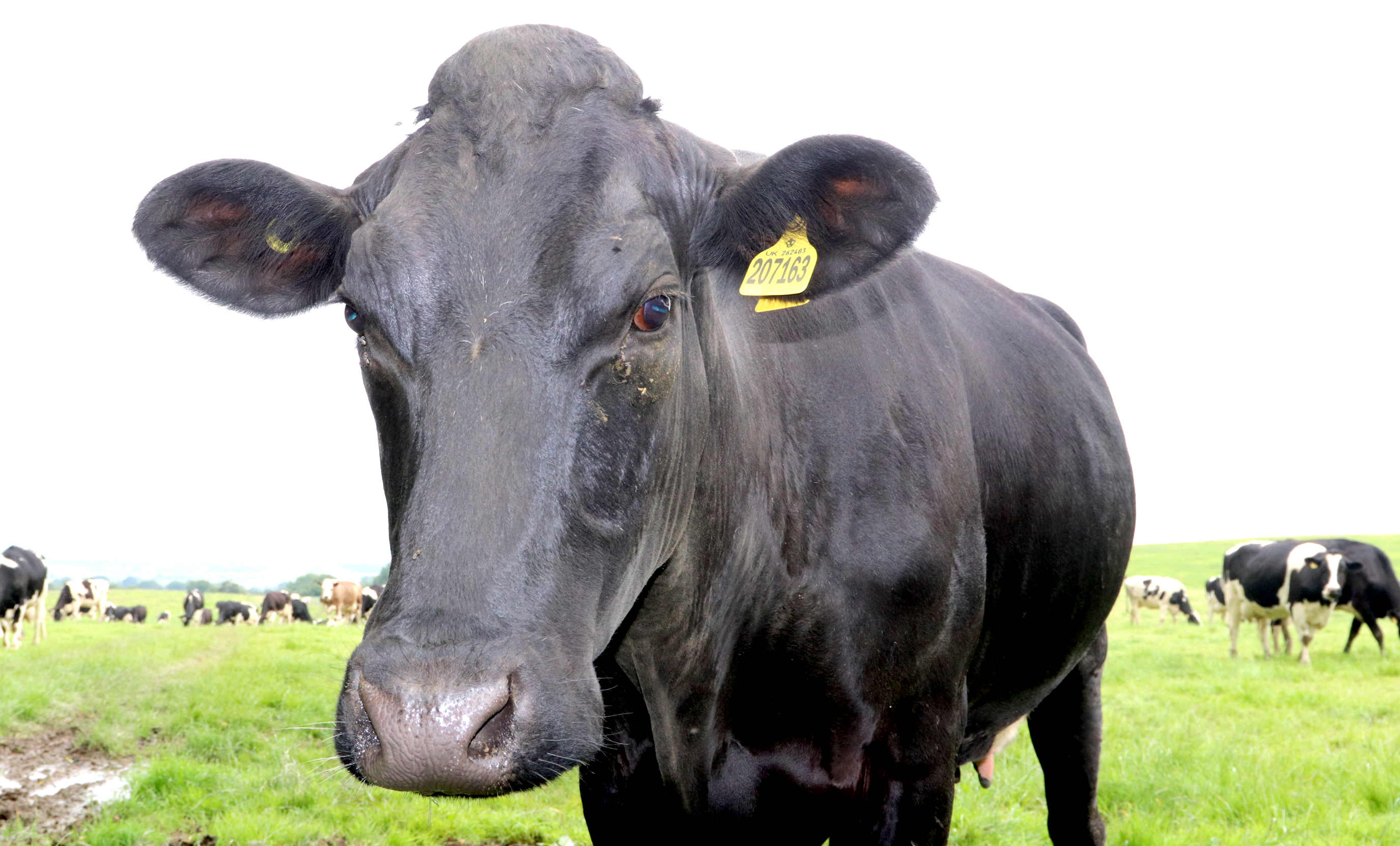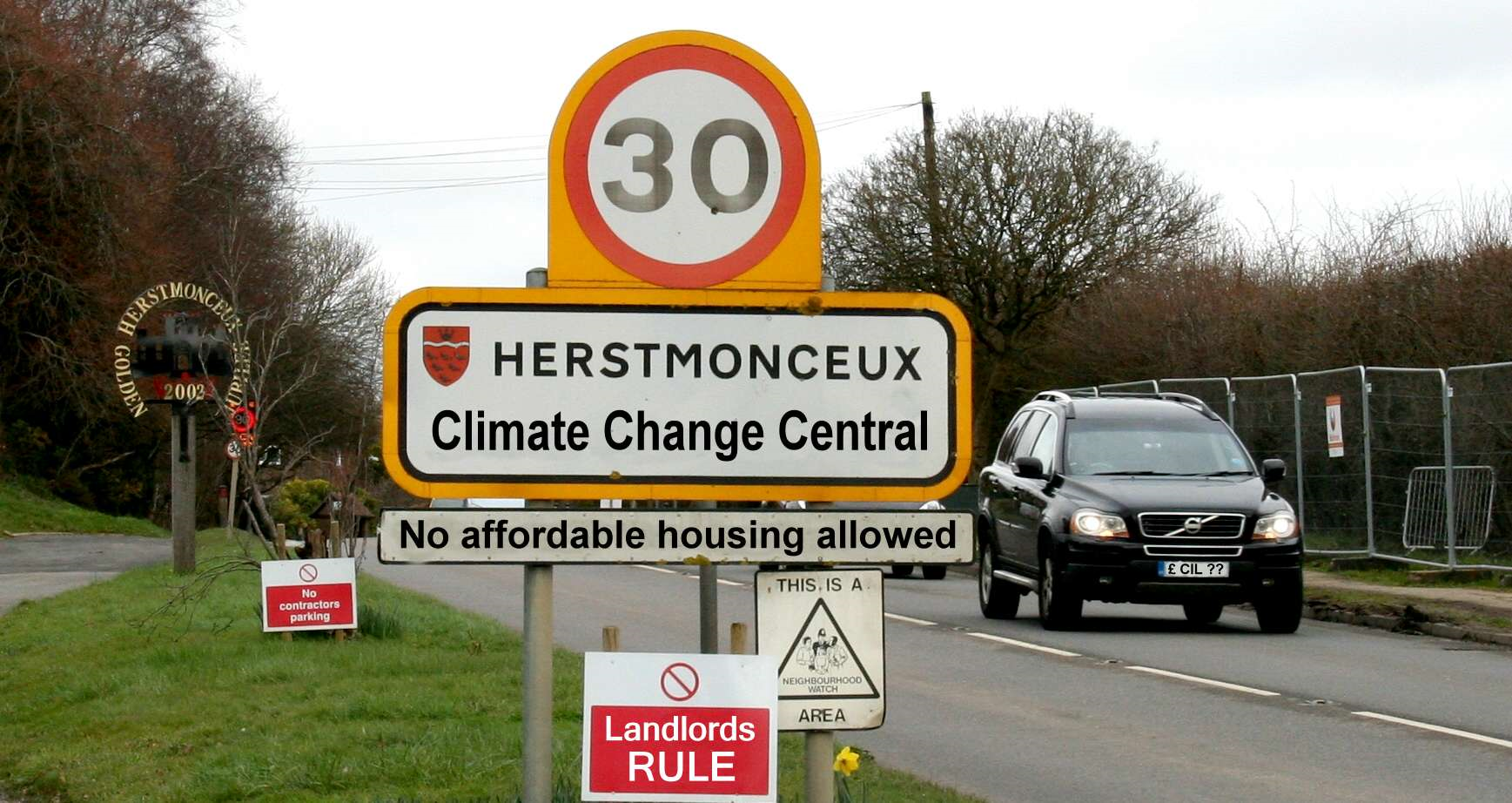|

JILL
THE DAIRY COW SAYS: - Hey,
don't you tell me when I need to do something. Do you know who you are
talking to? You can take that awful looking electricity
generating building in the field across the way and stick it up your rear
end. See if I care about conserving our heritage. I'll do what I want,
and you can't stop me. So there. But then, I'm only a cow chewing the
cud in a close by pasture. Presumably, human applicants would want to
protect evidence of their past, for future generations, no matter the
industrial landscape is less palatable to ruminants. If I ever come back in another
form, I hope I have two legs and opposable thumbs. Then we'll see. I
might get a job with the council. I hear they are in the pooh in a big
way, having been caught discriminating against some of the residents in
their area, for the benefit of others. I'd feel right at home, even if I do let a package go
occasionally. Nobody would notice with all the brown stuff hitting the
fan from all that institutionalised bullshit.
Cows don't violate Article 14, they just make milk, beef and leather
from grass.
This Act was granted Royal Assent on 17 October 1972[1] and meant that the United Kingdom became an official member of the European Economic Community on 1 January 1973.[2] Then
Brexit
came along thanks to David
Cameron, Theresa
May, and Boris
Johnson. However, the Human Rights Act 1998 provides some recourse
to HR justice, save for the fact that there is no Article
13, hence, the British, as a Constitutional Monarchy, with King
Charles III as the theoretical head of state, have expressly denied
their citizens the right to an effective remedy.
BACKGROUND
During the late 1940’s to early 1950’s it was found that the Western European supremacy was coming to an end and there were other powers rising up such as the United States and the Soviet Union.[3] So as to protect Europe from War and improve the economic climate, it was suggested that there should be economic integration.[4] In 1957, France, West Germany, Italy, the Netherlands, Belgium, and Luxembourg signed a treaty in Rome which established, for the first time, a European Economic Community which was referred to as the common market.[5]
Other Member states chose to decline in joining the common market, including the United Kingdom.[6] However, after clear signs of there being significant economic growth, the United Kingdom made two applications to become members, both of which were rejected due to the close ties the United Kingdom held with the United States.[7] There was also a political issue within the United Kingdom upon making the decisions to apply due to the UKs sovereignty.[8] The intention to become a member of the EEC created a split within the major political parties within the United Kingdom and in particular, there was a lot of resistance from the Labour party.[9] However, in 1973 the United Kingdom finally became members of the Common Market.[10]
MAIN AIM
The main purpose of the European Communities Act 1972[11] was to allow for European Union laws to be introduced into the domestic legislation which allowed for the United Kingdom to become a member of the European Economic Community.
WHAT WERE THE CHANGES?
The most significant change caused by the introduction of this Act[12] was the fact that it made the United Kingdom a member of the European Economic Community which meant that the United Kingdom was now subject to EU laws.[13]
One of the primary changes caused by this Act is under section 2(1).[14] This section states that EU provisions have direct effect within the United Kingdom.[15] This means that EU regulations and certain articles of the Treaties are automatically incorporated and binding within national law and there is no requirement for there to be a further Act of parliament.[16] This was one of the main factors which created problems within the United Kingdom when their introduction to the European Economic Community was first suggested. This was because it raised disputes as to whether the United Kingdom would remain a sovereign state should they join the EU as it allows for EU legislation to govern the United Kingdom without the introduction of any domestic laws.
Another change identified under section 2[17] is that EU legislation is supreme within any member state and if there are any disputes as to whether domestic legislation breaches EU laws, the member states courts are then obligated to submit questions to the European Court of Justice to get clarification on whether or not the domestic laws need to be changed.[18] This, again, was a significant change for the United Kingdom due to the fact that it is a dualist state.[19] This was a significant factor within the case of Factortame.[20]There was a dispute over whether a national court could provide interim relief where rights under community law were in dispute.[21] As community law is supreme it was held that a national court has the right to grant interim reliefs if the only obstacle, in a case concerning community law, is a national law.[22] This again demonstrates the changes caused to the legal system within the United Kingdom from becoming a member of the EEC.
Another change brought about by the introduction of this Act is how the United Kingdom is able to trade. By being a member of the EU the United Kingdom became part of a customs union where there are no tariffs on goods moved between member states and there is a common tariff for any goods imported/exported to a non EU state.[23] This change meant that there could be no independent trade policies.[24]
Finally, not only was the Freedom of Trade introduced by this Act but, as European legislation is to have supremacy within a member state, it also meant the introduction of provisions such as the right to freedom of movement[25] between member states and the right to freedom to provide services between member states.[26] These changes occurred within the United Kingdom simply by becoming a member. The primacy and direct effect of EU law has no formal basis in the founding treaties of the union, but was developed by the European Court of Justice (ECJ), long before UK accession, on the grounds that the purpose of the treaties would be thwarted if EU law were subordinate to national law. The view of the ECJ is that any norm of EU law takes precedence over national law, including national constitutions. Most national courts, including the United Kingdom's, do not accept this monist perspective. The primacy of EU law in the United Kingdom during the time of its membership was derived from the European Communities Act in Section 2 (4) which read as follows:
(4) The provision that may be made under subsection (2) above includes, subject to Schedule 2 to this Act, any such provision (of any such extent) as might be made by Act of Parliament, and any enactment passed or to be passed, other than one contained in this Part of this Act, shall be construed and have effect subject to the foregoing provisions of this section; but, except as may be provided by any Act passed after this Act, Schedule 2 shall have effect in connection with the powers conferred by this and the following sections of this Act to make Orders in Council and regulations. LACK
OF A WRITTEN CONSTITUTION
The British constitution is based on Parliamentary sovereignty,
with King
Charles III as the head of state - having a dualist view of international law: international treaties do not become part of UK domestic law unless they are incorporated into UK law by an Act of Parliament. This means that if the Act were repealed, any EU law (unless it has been transposed into British legislation) would, in practice, become unenforceable in the United Kingdom and Gibraltar, and the powers delegated by the Act to the EU institutions would return to the
Parliament of the United Kingdom. This was attempted to made clear to be the law in the United Kingdom by the
Conservative–Liberal Democrat Coalition with the inclusion of the "sovereignty clause" in the EU Act 2011 which was passed by the UK Parliament when the UK was still an EU member state.
FACTORFAME
In the House of Lords Factortame case, Lord Bridge confirmed that section 2(4) of the ECA effectively automatically inserts a virtual (implied) clause into all UK statutes, that they are to be automatically disapplied wherever they come into conflict with European law. This is seen by
some as a departure from the English constitutional doctrine of Westminster parliamentary sovereignty as it was and had been traditionally understood.
REPEAL
The United Kingdom voted for withdrawal from the European Union in the referendum held on 23 June 2016, and afterwards there was speculation that the act would be either repealed or amended. In October 2016, Prime Minister Theresa May promised a "Great Repeal Bill" which would repeal the 1972 Act and import its regulations into UK law, with effect from the date of British withdrawal; the regulations could then be amended or repealed on a case-by-case basis.
The European Union (Withdrawal) Bill was introduced in the House of Commons on 13 July 2017. It was passed by Parliament on 20 June 2018, and received royal assent on 26 June 2018. The European Union (Withdrawal) Act 2018 provides for the repeal of the European Communities Act 1972 at the time the United Kingdom exits the EU, on 29 March 2019 at 11:00 pm. However, in a July 2018 white paper, the government announced its intention to amend the Withdrawal Act to provide for the continued effect of the ECA until the end of the "transition period" (31 December 2020, as of July 2018), therefore allowing EU law to continue to apply in that period. This was achieved when the European Union (Withdrawal Agreement) Act 2020 was passed in January 2020 which "saved" the effect of the ECA until the end of the implementation period which was scheduled for 31 December 2020 before it was automatically repealed. REFERENCE
& LINKS
[1] Parliament, European Communities Act 1972 http://www.parliament.uk/about/living-heritage/evolutionofparliament/legislativescrutiny/parliament-and-europe/collections/parliament-and-europe/european-act-1972/
[2] Parliament, European Communities Act 1972 http://www.parliament.uk/about/living-heritage/evolutionofparliament/legislativescrutiny/parliament-and-europe/collections/parliament-and-europe/european-act-1972/
[3] This Day in History, Common Market Founded http://www.history.com/this-day-in-history/common-market-founded
[4] This Day in History, Common Market Founded http://www.history.com/this-day-in-history/common-market-founded
[5]Barnard C, The Substantive Law of the EU: The Four Freedoms, (2013, 4th Edn, OUP)
[6] This Day in History, Common Market Founded0 http://www.history.com/this-day-in-history/common-market-founded
[7] This Day in History, Common Market Founded http://www.history.com/this-day-in-history/common-market-founded
[8] Lord Norton, The Norton View: The European Communities Act 1972, (2010)
https://nortonview.wordpress.com/2010/11/19/the-european-communities-act-1972/
[9] Lord Norton, The Norton View: The European Communities Act 1972, (2010)
https://nortonview.wordpress.com/2010/11/19/the-european-communities-act-1972/
[10] Parliament, European Communities Act 1972, Available at http://www.parliament.uk/about/living-heritage/evolutionofparliament/legislativescrutiny/parliament-and-europe/collections/parliament-and-europe/european-act-1972/
[11] European Communities Act 1972
[12] European Communities Act 1972
[13] European Communities Act 1972
[14] European Communities Act 1972, S 2(1)
[15] European Communities Act 1972, S 2(1)
[16]Barnard C, The Substantive Law of the EU: The Four Freedoms, (2013, 4th Edn, OUP)
[17] European Communities Act 1972, S 2
[18] European Communities Act 1972, S 2
[19] House of Commons, The EU Bill and Parliamentary Sovereignty – European Scrutiny Committee,(2010)
http://www.publications.parliament.uk/pa/cm201011/cmselect/cmeuleg/633/63304.htm
[20] C-221/89 R v Secretary of State for Transport ex p. Factortame(Factortame 2) [1991] ECR I-3905
[21] C-221/89 R v Secretary of State for Transport ex p. Factortame(Factortame 2) [1991] ECR I-3905
[22] C-221/89 R v Secretary of State for Transport ex p. Factortame(Factortame 2) [1991] ECR I-3905
[23] House of Commons, The Economic Impact of EU membership on the UK, (2013), SN/EP/6730
[24] House of Commons, The Economic Impact of EU membership on the UK, (2013), SN/EP/6730
[25] House of Commons, The Economic Impact of EU membership on the UK, (2013), SN/EP/6730
[26] House of Commons, The Economic Impact of EU membership on the UK, (2013),
SN/EP/6730 Access
to Neighbouring Land Act 1992 Ancient
Monuments and Archaeological Areas Act 1979 Beaumont
Vs Florala 2020 - Right to Light case precedent Criminal
Damage Act 1971 Criminal
Law Act 1977 European
Communities Act 1972 Fraud
Act 2006 Party Wall Act 1996 Planning
(Listed Buildings and Conservation Areas) Act 1990 Prescription
Act 1832 R
v Dytham 1979 QBD, Malfeasance in Public Office R
v Sussex Justices ex-parte McCarthy 1924, bias undoes conviction

THE
ONLY
ONE LEFT - This unassuming building is believed to be the earliest
surviving example of electricity generating and load leveling on the
planet. In the world of industrial archaeology, this is a gem. All the
more intriguing for being nestled out of the way in the country. Notably
not understood for it's importance by local politicians and even some
immediate neighbors. Some of which had in the past wanted
to purchase it, simply to knock it down. Sadly, with the local authority
aiding and abetting such ambition. We hope those days are gone for good.
But the fact remains, that the building still has no reasonable or
beneficial use. Despite a Court Order from 2003/4, where Wealden DC
agreed to rectify that malady. Progress was made up to 2008, then all
cooperation ceased. It has been 14 years, and once again we are waiting
for answers to correspondence, as to what the council intend doing to
remedy their maladministration.
The
heritage asset above in included on Step 4 of a Monument Protection
Programme focusing on the electrical generating industry, and how it
began. There are two recent planning applications affecting this
building. One was a Major development for up to 70 houses in the
adjacent field. The other was from within Lime Park, from the new owners
of The
Old Rectory, in 2022, Ms
Finn and Mr
Flood. Yet, it seems (it is alleged) that no Heritage Statement
accompanied their application: WD/2022/0497/F, and no Notice as to the Party
Wall Act was given concerning the Generating Buildings. No
clarification has been forthcoming from the applicants, the council or
East Sussex County Council.
REFERENCE
https://www.lawteacher.net/acts/european-communities-act-1972.php

2022 -
Herstmonceux in Sussex is not what it used to be. Villagers are being
forced to rent in towns, rather than being able to live where they were
brought up - at reasonable prices. In modern England, councils are
operated against the interests of young families. Rents for new builds
in Herstmonceux are exorbitant. There are no genuinely affordable
houses. Wealden only grant consent for executive housing in major
development. Wealden provide no rolling stock of land for affordable
(self builds) flat packs, etc. The rich get richer and the poor,
poorer. This seems to be the Conservative way, with Labour failing to
change statute, when they finally get voted in.
Please use our
A-Z INDEX to
navigate this site
|

